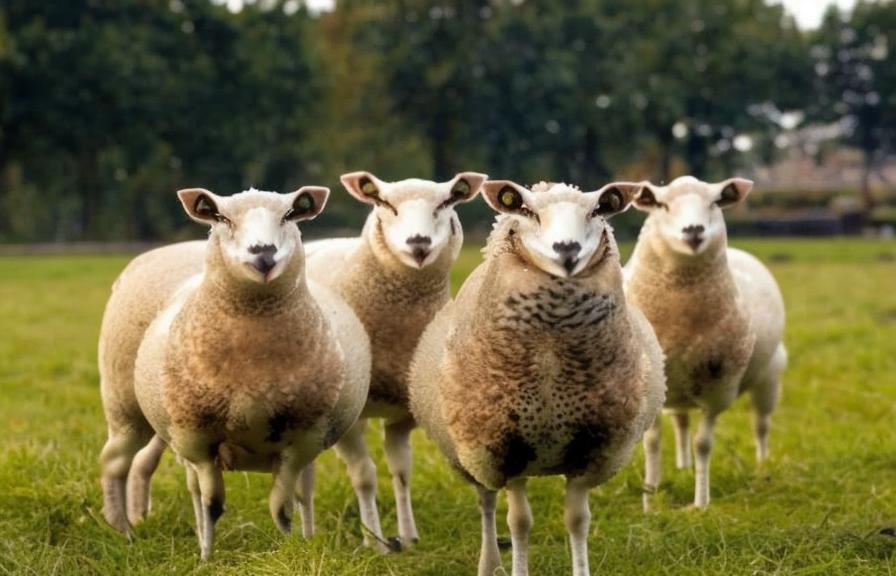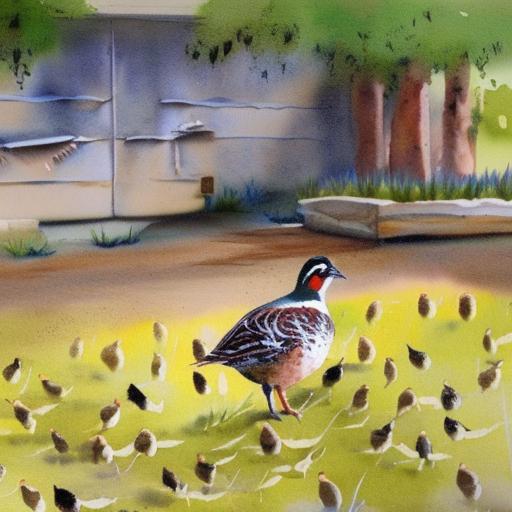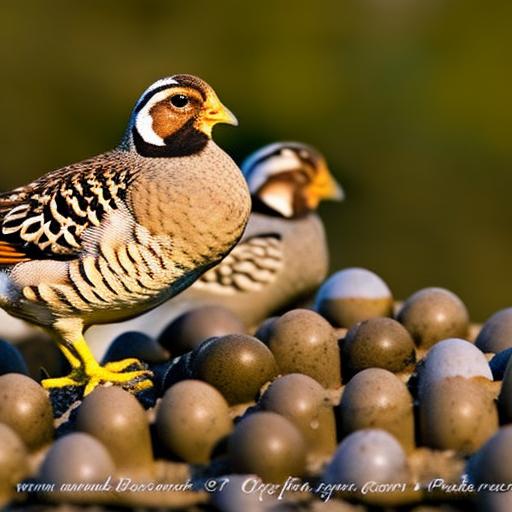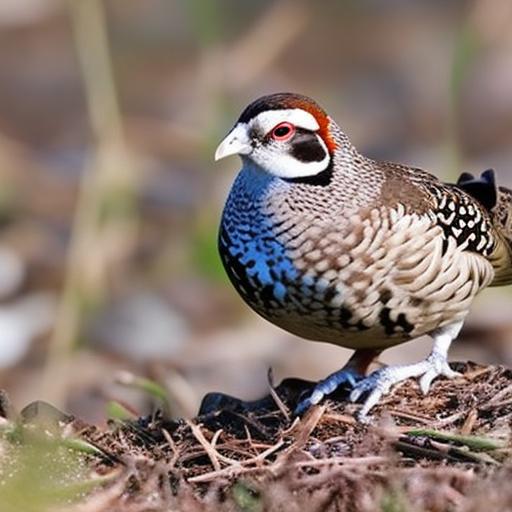Quail breeding has a long and rich history that dates back thousands of years. The practice of domesticating and breeding quail can be traced back to ancient civilizations such as the Egyptians, Greeks, and Romans. These early civilizations recognized the value of quail as a source of food and began breeding them for their eggs and meat. Over time, quail breeding techniques evolved, and different breeds of quail were developed for specific purposes, such as meat production, egg laying, or hunting.
In more recent history, quail breeding has become a popular hobby for enthusiasts and a profitable business for commercial breeders. With advancements in breeding techniques and genetics, breeders have been able to develop new and improved quail breeds with desirable traits such as high egg production, fast growth rates, and disease resistance. Today, quail breeding continues to be an important industry, providing a sustainable source of protein for human consumption and contributing to conservation efforts for endangered quail species.
Quail breeding has come a long way since its early beginnings, and it continues to play a significant role in agriculture, conservation, and recreation. The history of quail breeding is a testament to the ingenuity and resourcefulness of humans in harnessing the potential of these small but mighty birds.
Key Takeaways
- Quail breeding has a long history dating back to ancient civilizations, where they were valued for their meat and eggs.
- When selecting a quail breeder, it’s important to consider factors such as reputation, experience, and the quality of their breeding practices.
- Proper quail breeding practices are essential for maintaining the health and genetic diversity of quail populations.
- There are various quail breeds, each with unique characteristics and suitability for different purposes such as meat production or egg laying.
- Caring for quail involves providing proper housing, nutrition, and healthcare, which can vary depending on the breed and purpose.
Selecting the Right Quail Breeder for Your Needs
When it comes to selecting a quail breeder, there are several important factors to consider to ensure that you are getting high-quality birds that meet your specific needs. First and foremost, it is essential to research the reputation and experience of the breeder. Look for breeders who have a proven track record of producing healthy, well-cared-for quail with desirable traits. You can often find reviews and testimonials from other customers to gauge the breeder’s reputation.
Another important consideration when selecting a quail breeder is the quality of their facilities and breeding practices. A reputable breeder will have clean, well-maintained facilities that provide a healthy and safe environment for the quail. They should also follow ethical breeding practices and prioritize the welfare of their birds. Ask the breeder about their breeding methods, feeding practices, and health care protocols to ensure that they are committed to producing high-quality quail.
It is also important to consider the breed and variety of quail that the breeder specializes in. Different breeds of quail have unique characteristics and are bred for specific purposes, such as egg production, meat quality, or hunting. Make sure that the breeder offers the specific breed or variety of quail that aligns with your goals and needs. By carefully considering these factors, you can select a quail breeder who will provide you with healthy, well-bred birds that meet your specific requirements.
The Importance of Proper Quail Breeding Practices
Proper quail breeding practices are essential for ensuring the health and welfare of the birds, as well as producing high-quality offspring with desirable traits. Breeding quail requires careful attention to detail and adherence to best practices to prevent genetic issues, disease transmission, and other potential problems. One of the most critical aspects of proper quail breeding is genetic diversity. Inbreeding can lead to genetic abnormalities and health issues in offspring, so breeders must carefully manage their breeding stock to maintain genetic diversity within their quail populations.
Another important aspect of proper quail breeding is nutrition and care. Breeding quail should be provided with a balanced diet that meets their nutritional needs for optimal health and reproductive success. Additionally, breeders must ensure that their quail are housed in clean, spacious environments that promote natural behaviors and minimize stress. Proper care and management of breeding quail are essential for maximizing fertility, hatchability, and overall reproductive success.
Furthermore, disease prevention and biosecurity are crucial components of proper quail breeding practices. Breeders must implement strict biosecurity measures to prevent the introduction and spread of diseases within their quail populations. Regular health monitoring, vaccination protocols, and quarantine procedures are essential for maintaining healthy breeding stock and preventing disease outbreaks. By prioritizing genetic diversity, nutrition, care, and disease prevention, breeders can uphold proper quail breeding practices that contribute to the overall health and success of their quail populations.
Understanding the Different Quail Breeds
There are several different breeds of quail that have been developed for various purposes, each with its own unique characteristics and traits. One of the most popular breeds of quail is the Coturnix or Japanese quail, which is widely bred for its prolific egg production and fast growth rate. Coturnix quail come in a variety of color mutations and are well-suited for small-scale egg production operations or as pets due to their docile nature.
Another common breed of quail is the Bobwhite quail, which is popular for hunting and game bird operations. Bobwhite quail are known for their strong flying abilities and are often raised for release into hunting preserves or for field trials. They require larger outdoor enclosures and are prized for their wild behavior and challenging hunting experience.
In addition to Coturnix and Bobwhite quail, there are several other breeds and varieties of quail that are bred for specific purposes such as meat production, ornamental purposes, or conservation efforts. Each breed of quail has its own unique characteristics in terms of size, coloration, behavior, and productivity, making it important for breeders and enthusiasts to understand the differences between breeds when selecting birds for their specific needs.
By understanding the different breeds of quail and their specific traits, breeders can make informed decisions about which breeds to work with based on their goals and objectives. Whether it’s for egg production, meat quality, hunting, or conservation, there is a breed of quail that is well-suited for a wide range of purposes.
Tips for Caring for Quail from a Breeder
Caring for quail from a breeder requires attention to detail and a commitment to providing the birds with a healthy and comfortable environment. When bringing home quail from a breeder, it is important to have a suitable housing setup ready before their arrival. Quail require secure housing that protects them from predators and provides adequate space for natural behaviors such as dust bathing and foraging. Additionally, providing appropriate bedding material, perches, and nesting boxes will help ensure that the quail are comfortable in their new environment.
Another important aspect of caring for quail from a breeder is nutrition. Quail should be provided with a balanced diet that meets their specific nutritional requirements based on their age, breed, and purpose. High-quality commercial feed formulated for quail can serve as the foundation of their diet, supplemented with fresh greens, fruits, and protein sources such as mealworms or crickets. Clean water should always be available to ensure proper hydration.
Furthermore, regular health monitoring is essential for caring for quail from a breeder. Observing the birds daily for signs of illness or injury can help detect potential health issues early on. Additionally, establishing a relationship with a veterinarian experienced in avian care can provide valuable support in maintaining the health and well-being of the quail. By following these tips for caring for quail from a breeder, enthusiasts can ensure that their birds thrive in their new home.
The Role of Quail Breeders in Conservation Efforts

Quail breeders play a crucial role in conservation efforts aimed at preserving endangered species of quail and restoring their populations in the wild. Many species of quail are facing habitat loss, predation, and other threats that have led to declining populations in their natural habitats. Quail breeders can contribute to conservation efforts by participating in captive breeding programs that aim to maintain genetic diversity and produce offspring for release into the wild.
Captive breeding programs often involve working closely with wildlife agencies, conservation organizations, and researchers to develop strategies for reintroducing captive-bred quail into suitable habitats where they can thrive. By providing genetically diverse offspring from carefully managed breeding stock, quail breeders can help bolster wild populations and contribute to the long-term survival of endangered species.
In addition to captive breeding programs, quail breeders can also support conservation efforts by raising awareness about the importance of preserving natural habitats for wild quail populations. Educating the public about the ecological significance of quail and the threats they face can help garner support for habitat conservation initiatives and promote responsible land management practices that benefit quail and other wildlife.
Overall, the role of quail breeders in conservation efforts is vital for safeguarding the future of these charismatic birds and their natural habitats. By actively participating in captive breeding programs, raising awareness about conservation issues, and supporting habitat preservation efforts, breeders can make a meaningful contribution to the conservation of endangered species of quail.
Finding a Reputable Quail Breeder in Your Area
Finding a reputable quail breeder in your area requires careful research and consideration to ensure that you are getting high-quality birds from a trustworthy source. One way to find a reputable breeder is by seeking recommendations from other poultry enthusiasts or local agricultural organizations. Word-of-mouth referrals can provide valuable insights into breeders who have a solid reputation for producing healthy, well-cared-for quail.
Another approach to finding a reputable quail breeder is by attending poultry shows, fairs, or expos where breeders showcase their birds. These events offer an opportunity to meet breeders in person, see their birds firsthand, and ask questions about their breeding practices and available stock. Additionally, networking with other attendees can provide leads on reputable breeders in your area.
Online resources such as breeder directories, forums, and social media groups can also be valuable tools for finding reputable quail breeders. Many breeders maintain websites or social media pages where they showcase their birds, share information about their breeding practices, and connect with potential customers. Researching breeders online can help you gather information about their reputation, experience, available stock, and customer reviews.
When evaluating potential breeders, it is important to ask questions about their breeding practices, facilities, available stock, and customer references. Visiting the breeder’s facilities in person can also provide valuable insights into their operation and the quality of their birds. By taking these steps to find a reputable quail breeder in your area, you can feel confident that you are acquiring healthy, well-bred birds from a trustworthy source.
In conclusion, the history of quail breeding is rich and diverse, with roots dating back thousands of years to ancient civilizations. Selecting the right quail breeder involves careful consideration of factors such as reputation, facilities, breeding practices, and available stock. Proper breeding practices are essential for maintaining genetic diversity, promoting health and welfare, preventing disease transmission, and maximizing reproductive success in quail populations. Understanding the different breeds of quail is important for selecting birds that align with specific goals and objectives. Caring for quail from a breeder requires attention to housing setup, nutrition, health monitoring, and veterinary care. Quail breeders play a vital role in conservation efforts by participating in captive breeding programs and raising awareness about habitat preservation. Finding a reputable quail breeder involves research through referrals, events attendance networking online resources evaluation visits.
In conclusion, the history of quail breeding is rich and diverse, with roots dating back thousands of years to ancient civilizations. Selecting the right quail breeder involves careful consideration of factors such as reputation, facilities, breeding practices, and available stock. Proper breeding practices are essential for maintaining genetic diversity, promoting health and welfare, preventing disease transmission, and maximizing reproductive success in quail populations. Understanding the different breeds of quail is important for selecting birds that align with specific goals and objectives. Caring for quail from a breeder requires attention to housing setup, nutrition, health monitoring, and veterinary care. Quail breeders play a vital role in conservation efforts by participating in captive breeding programs and raising awareness about habitat preservation. Finding a reputable quail breeder involves research through referrals, attending events, networking, utilizing online resources, and conducting evaluation visits.
If you’re a quail breeder looking to expand your knowledge of poultry care, you might be interested in an article on PoultryWizard.com about creating a garden chicken coop. This article provides valuable insights into designing a coop that integrates seamlessly with your garden, offering practical tips and ideas for creating a harmonious environment for both your chickens and your plants. Check it out here.
FAQs
What is a quail breeder?
A quail breeder is a person or business that specializes in breeding and raising quail for various purposes, such as meat production, egg production, or as pets.
What do quail breeders do?
Quail breeders are responsible for selecting and breeding quail with desirable traits, providing proper care and nutrition for the birds, and managing the breeding process to ensure healthy offspring.
What are the common breeds of quail bred by quail breeders?
Common breeds of quail bred by quail breeders include Coturnix quail (also known as Japanese quail), Bobwhite quail, and California quail. Each breed has its own unique characteristics and is bred for different purposes.
What are the main purposes of quail breeding?
Quail breeding is primarily done for meat production, egg production, and as pets. Some quail breeders also breed quail for hunting purposes.
What are the key considerations for quail breeders?
Quail breeders must consider factors such as proper housing, nutrition, breeding techniques, and disease prevention to ensure the health and well-being of their quail. They also need to comply with any relevant regulations and standards for quail breeding.
How can I find a reputable quail breeder?
To find a reputable quail breeder, you can research online, ask for recommendations from other quail enthusiasts or agricultural organizations, and visit local farms or breeders to see their operations firsthand. It’s important to choose a breeder who prioritizes the health and welfare of their quail.
Meet Walter, the feathered-friend fanatic of Florida! Nestled in the sunshine state, Walter struts through life with his feathered companions, clucking his way to happiness. With a coop that’s fancier than a five-star hotel, he’s the Don Juan of the chicken world. When he’s not teaching his hens to do the cha-cha, you’ll find him in a heated debate with his prized rooster, Sir Clucks-a-Lot. Walter’s poultry passion is no yolk; he’s the sunny-side-up guy you never knew you needed in your flock of friends!







